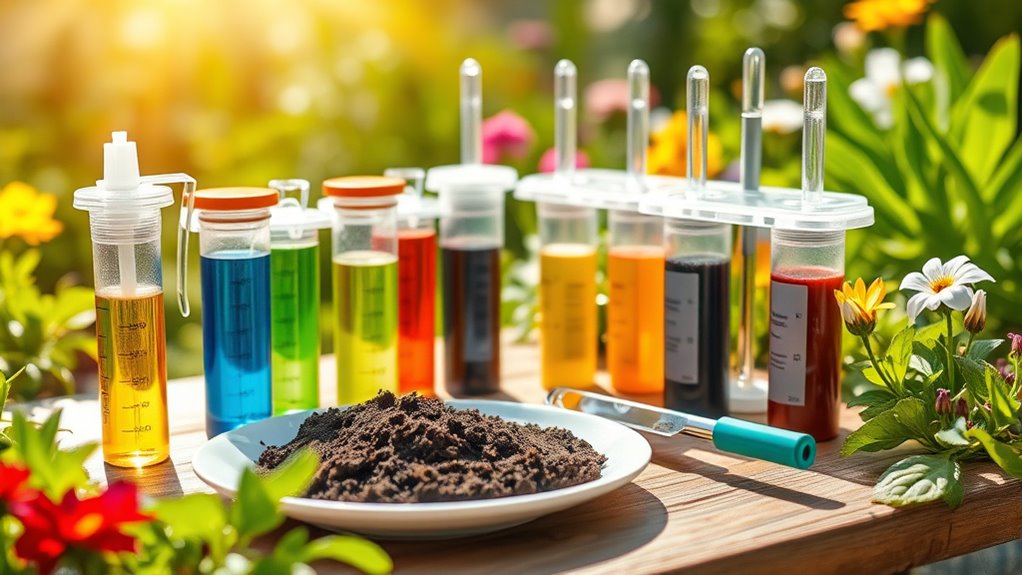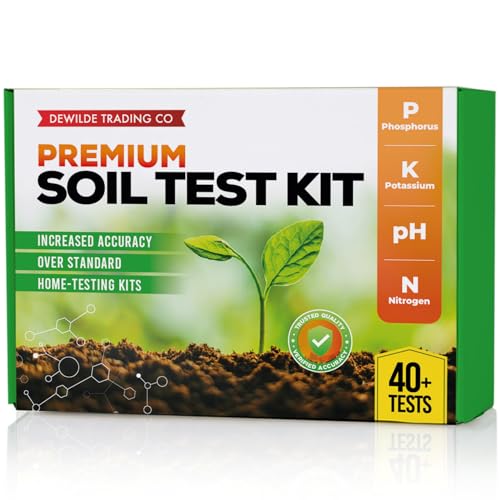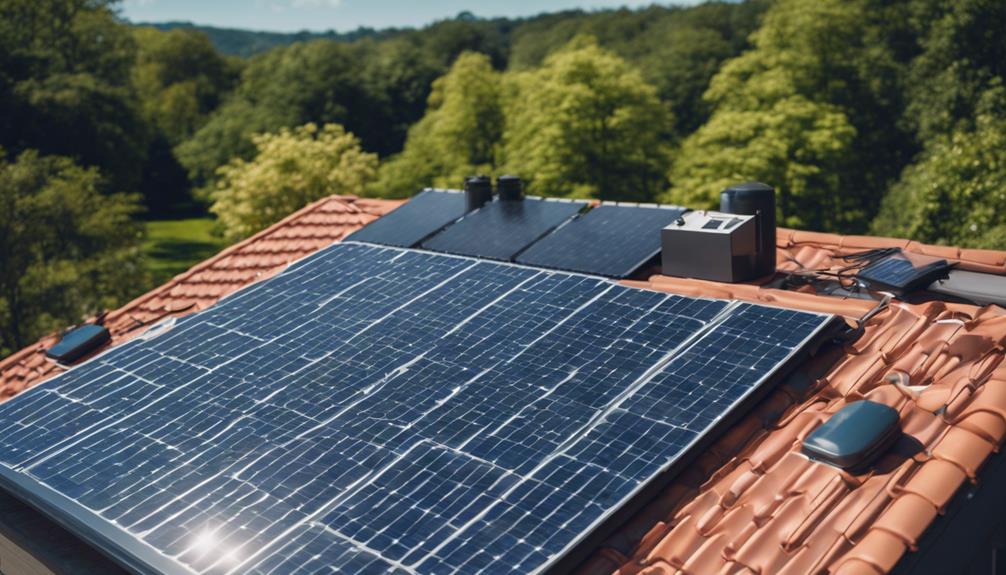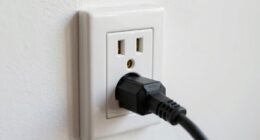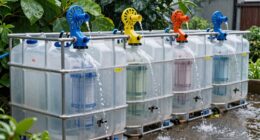If you're looking to boost your garden's health, I've got a list of the 12 best soil testing kits that'll help you get started. These kits cater to all skill levels and cover essential nutrients like pH, Nitrogen, Phosphorus, and Potassium. Plus, some offer up to 140 tests for thorough analysis. They're user-friendly and provide quick results, so you can make informed decisions easily. Stick around to discover which kits made the cut!
Key Takeaways
- Choose kits offering comprehensive testing for pH, N, P, and K to optimize soil health in your garden.
- Look for user-friendly designs that provide clear instructions for ease of use, catering to all skill levels.
- Consider kits with a higher number of tests, ideally around 140, for thorough monitoring of soil conditions.
- Evaluate accuracy and reliability through user reviews, especially for nitrogen and potassium measurements.
- Opt for cost-effective kits that deliver quick results, enabling immediate gardening decisions and long-term savings.
Premium Soil Test Kit for Lawns and Gardens (40 Complete Tests)
If you're a gardener looking to elevate your plant game, the Premium Soil Test Kit for Lawns and Gardens is your go-to choice. This kit includes 40 complete tests for essential nutrients like ammonia nitrogen, pH, phosphorus, and potassium. It's user-friendly, making it ideal for both beginners and seasoned gardeners. I love how portable it is, plus it saves me from expensive lab services. While the potassium test can be tricky, the kit provides a reliable snapshot of soil health. By regularly testing, I can adjust my fertilization and keep my plants thriving. Trust me, it's a game changer!
Best For: Gardeners of all experience levels who want a cost-effective and convenient way to assess and improve their soil health.
Pros:
- User-friendly design with clear instructions makes it accessible for beginners.
- Portable and eliminates the need for expensive lab testing services.
- Offers a comprehensive assessment of essential soil nutrients with 40 complete tests.
Cons:
- Some users find the potassium test difficult to read and results may vary.
- Confusion may arise regarding the number of tests available for each nutrient.
- Color differentiation in results can be challenging, providing only a general idea of nutrient levels.
Soil Test Kit for Vegetable Garden and Lawn (140 Tests)
The Soil Test Kit for Vegetable Garden and Lawn is an ideal choice for both novice and seasoned gardeners looking to enhance their soil's health. With 140 tests available, it evaluates pH, ammonia, nitrogen, phosphorus, and potassium levels, giving you a thorough understanding of your soil's fertility. I appreciate how quickly I get results—often in under an hour—allowing me to take immediate action. The included instructions are straightforward, making it easy to follow. However, I'd advise using caution with the results, especially for nitrogen levels, and consider further research to interpret findings accurately. Overall, it's a valuable gardening tool!
Best For: The Soil Test Kit is best for both novice and experienced gardeners looking to assess and improve their soil health efficiently.
Pros:
- Quick results: Provides test results in under an hour, allowing for timely action.
- Comprehensive analysis: Tests multiple essential soil parameters, including pH and nutrient levels.
- User-friendly: Easy-to-follow instructions make it accessible for all skill levels.
Cons:
- Accuracy concerns: Some users reported potential inaccuracies, particularly with nitrogen levels.
- Conflicting instructions: A few users experienced issues with unclear or inconsistent directions.
- Limited reliability: Caution is advised when interpreting results, as further research may be necessary.
Rapitest Soil Test Kit for Gardens and Lawns
For gardeners seeking an easy and effective way to assess their soil health, the Rapitest Soil Test Kit stands out as an ideal choice. It measures pH, nitrogen, phosphorus, and potassium, providing quick at-home results with a user-friendly capsule system. I appreciate that it includes components for 20 tests and a soil pH preference list for over 450 plants. While some users mentioned a learning curve with color interpretation, the kit's overall performance remains reliable. Just be sure to test in good lighting, and consider using scissors to open the capsules easily. It's a practical investment for enhancing your garden!
Best For: Gardeners, both beginners and experienced, looking for an easy-to-use kit to assess soil health for optimal plant growth.
Pros:
- Easy setup and user-friendly capsule system for quick at-home testing.
- Comprehensive coverage of essential soil components (pH, N, P, K) for diverse plants.
- Provides a soil pH preference list for over 450 plants, enhancing gardening decisions.
Cons:
- Some users experience a learning curve with color interpretation, which may lead to inaccuracies.
- Limited number of tests available (only 20), requiring additional capsule purchases for frequent testing.
- Difficulty opening capsules reported, necessitating the use of scissors for easier access.
MySoil Soil Test Kit for Lawn & Garden Analysis
Gardeners seeking precise soil analysis will find the MySoil Soil Test Kit an invaluable tool. This kit offers a complete nutrient and pH analysis tailored to your specific soil needs. It tests any soil type for various scenarios, including lawns and gardens. With easy-to-follow instructions and a prepaid envelope for lab analysis, I found it user-friendly. The accuracy is impressive, providing results for 13 nutrient levels within just 6-8 days. Plus, it's cost-effective, saving me from unnecessary product applications. I've noticed significant improvements in my garden health after following the tailored recommendations. Highly recommended for serious gardeners!
Best For: Gardeners and lawn enthusiasts looking for accurate soil analysis to improve plant health.
Pros:
- Provides fast and accurate results for 13 nutrient levels, including pH.
- User-friendly with straightforward instructions and a prepaid mailing envelope.
- Cost-effective, helping to prevent unnecessary product applications and saving time.
Cons:
- Requires mailing soil samples, which may be inconvenient for some users.
- Results take 6-8 days, which may delay immediate gardening decisions.
- Limited to nutrient analysis; does not provide specific pest or disease diagnostics.
Soil pH Test Kit with 100 Test Strips & AI-Powered Web Reader
Whether you're a seasoned gardener or just starting out, the Soil pH Test Kit with 100 Test Strips and an AI-powered web reader makes soil testing straightforward and reliable. With fast results in just 60 seconds, I love how the kit includes everything I need—test strips, a color chart, a guidebook, and an online pH calculator. It's suitable for all soil types, and I appreciate that no batteries or calibration are required. While some users face challenges with color matching, the accuracy often rivals lab tests, helping me improve my plants' health and yields. Overall, it's a valuable addition to my gardening tools.
Best For: Home gardeners looking for an easy and accurate way to test soil pH levels for improved plant health and yields.
Pros:
- Fast and accurate results in just 60 seconds, suitable for all soil types.
- No batteries or calibration required, making it user-friendly.
- Trusted by over 100,000 gardeners, with many reports of results aligning with lab tests.
Cons:
- Some users find it challenging to match test strip colors to the chart accurately.
- Occasional packaging issues, with reports of damaged or used items.
- Precision concerns have been noted, especially regarding readings within 0.5 pH units.
Soil pH Meter 3-in-1 Gardening Tool for Plant Care
The Soil pH Meter 3-in-1 Gardening Tool is perfect for casual gardeners and houseplant enthusiasts who want an easy way to monitor their plants' health. This handy device tests soil moisture, pH levels, and sunlight exposure without needing batteries—just insert it into the soil. I love its sturdy design, making it suitable for both indoor and outdoor use. While it provides approximate readings, it's great for preventing overwatering. Just remember to wait until the soil surface is dry before testing. For precise pH measurements, consider using pH paper as a backup. Overall, it's a valuable tool for basic gardening needs!
Best For: Casual gardeners and houseplant enthusiasts seeking an easy way to monitor soil health.
Pros:
- Easy to use with no batteries required; simply insert into the soil for readings.
- Sturdy design suitable for both indoor and outdoor gardening.
- Helps prevent overwatering by providing moisture level readings.
Cons:
- pH readings may not be precise, providing only approximate measurements.
- Performance may decline after a year of use, particularly in certain soil types.
- Light meter is less effective under artificial lighting conditions.
Soil Test Kit for 4 Parameters (40 Tests)
If you want to take your gardening skills to the next level, this Soil Test Kit for 4 Parameters is perfect for you. It offers 40 tests total—10 each for pH, Nitrogen, Phosphorus, and Potassium—making it versatile for all soil types. The kit comes with easy-to-follow instructions, so even beginners can use it confidently. I love how the colorimetric results allow me to quickly interpret nutrient levels. Plus, I can test multiple spots in my garden to guarantee balanced soil conditions. This not only saves me money on unnecessary fertilizers but also boosts my plant yields considerably!
Best For: Gardeners of all skill levels looking to optimize soil conditions for healthy plant growth.
Pros:
- User-friendly instructions make it accessible for beginners.
- Colorimetric results provide quick and accurate interpretation of nutrient levels.
- Allows testing in multiple spots, helping to balance soil nutrients and reduce fertilizer costs.
Cons:
- Limited to testing only four parameters (pH, Nitrogen, Phosphorus, Potassium).
- May require additional kits for more comprehensive soil analysis.
- Results may vary based on user technique and soil sampling methods.
Sunday Soil Test Kit for Lawns
For anyone looking to enhance their lawn care routine, the Sunday Soil Test Kit stands out as an essential tool. It helps tailor your lawn care plans by testing for crucial nutrients, ensuring your turf stays strong and green. The process is straightforward: you collect soil samples, mix them, and send them off using the included materials. Results typically arrive in 3-4 weeks, offering expert analysis that guides your lawn care decisions. Many users find it easy to use, though some report delays in results. Overall, it's a valuable investment for achieving a lush, healthy lawn.
Best For: Individuals looking to enhance their lawn care by understanding soil nutrient levels and tailoring their maintenance plans accordingly.
Pros:
- Easy-to-follow instructions make the soil sampling process straightforward.
- Provides expert analysis to guide customized lawn care plans.
- Helps prevent overuse of nutrients, benefiting both the lawn and the environment.
Cons:
- Some users experience delays in receiving results.
- Excessive promotional emails from Sunday can be frustrating for some users.
- Alternative soil test kits may not have aggressive marketing tactics.
4-in-1 Soil Moisture Meter for Gardening and Farming
Looking for a reliable tool to help you gauge your garden's health? The 4-in-1 Soil Moisture Meter is a game changer! It measures soil moisture, pH, temperature, and sunlight intensity, making it perfect for gardeners like me. With a large LCD screen and an adjustable head, I can easily read it without bending over. Just plug it into the soil about four inches deep, and I get quick results in 10 seconds. While pH readings may vary, its affordability and user-friendly design make it a must-have for anyone managing multiple plants. This meter keeps my garden thriving!
Best For: Gardeners and farmers looking for an easy-to-use device to monitor soil health and conditions for multiple plants.
Pros:
- User-friendly design with quick readings in just 10 seconds.
- Large LCD screen with backlight for easy visibility in different lighting.
- Affordable compared to individual meters, making it a great value for gardeners.
Cons:
- pH and light readings may show slight inaccuracies.
- Some users find the viewing angle of the display challenging.
- Requires four AAA batteries that are not included with the device.
INTBUYING Soil Sampler Probe with Sample Ejector
The INTBUYING Soil Sampler Probe with Sample Ejector stands out for its user-friendly design, making it an ideal choice for both novice and experienced gardeners. I love its durable 304 stainless steel construction, which guarantees rust and corrosion resistance. The 40-inch length allows me to reach deep into the soil, while the alligator-style opening makes core extraction a breeze. With the side foot-step and bulldozing rod, I can easily insert it into the ground without straining. Plus, the rubber grips provide comfort during use. This tool has truly enhanced my gardening experience by simplifying soil sampling!
Best For: Gardeners and soil scientists looking for a durable and user-friendly tool for soil sampling.
Pros:
- Durable 304 stainless steel construction ensures rust and corrosion resistance.
- User-friendly design with an alligator-style opening for easy core extraction.
- Comfort-enhancing rubber grips and side foot-step for effortless ground insertion.
Cons:
- The 2.7-inch diameter may not be suitable for larger soil samples.
- The 40-inch length may be cumbersome for users with limited storage space.
- Price point may be higher compared to basic soil sampling tools.
Soil Test Kit – 4-in-1 Soil Testing Kit for Garden and Lawn
Gardeners seeking a reliable and convenient way to assess their soil's health will find the 4-in-1 Soil Test Kit particularly appealing. This kit tests for pH, nitrogen, phosphorus, and potassium, providing thorough insights with just one tool. With enough components for 40 tests, it's both cost-effective and portable, perfect for testing various plants indoors or outdoors. I appreciate its user-friendly design, featuring a quick guide and everything you need for accurate results. However, I've noticed mixed reviews on clarity of instructions and some accuracy concerns. Overall, it's a solid choice for informed gardening decisions.
Best For: Gardeners looking for a convenient and cost-effective solution to assess soil health for various plants both indoors and outdoors.
Pros:
- User-friendly design with a quick guide and all necessary components for accurate testing.
- Cost-effective, allowing for 40 tests without the need for laboratory analysis.
- Positive customer feedback on reliability and consistent results across different garden areas.
Cons:
- Some users reported unclear instructions, leading to potential confusion during testing.
- Accuracy issues noted by certain users, with inconsistent results compared to professional soil analysis.
- Tests for all parameters simultaneously, lacking the ability for individual nutrient testing.
4-in-1 Soil Moisture Meter for Gardening and Farming
For anyone serious about maintaining healthy plants, the 4-in-1 Soil Moisture Meter stands out as an essential tool. This handy device measures soil moisture, pH, temperature, and sunlight intensity, making it perfect for gardening and farming. I love its large LCD screen that's easy to read, even in bright sunlight. Just plug the probe into the soil and get quick readings in about 10 seconds. The adjustable head means I don't have to bend over, which is a bonus! While pH and light readings may vary, it's still a great value for quickly evaluating my plants' needs.
Best For: Gardeners and farmers looking for a quick and efficient way to assess soil conditions and plant health.
Pros:
- User-friendly design allows for easy operation and quick readings.
- Large LCD screen provides clear visibility in various lighting conditions.
- Affordable multifunctional device compared to purchasing individual meters.
Cons:
- pH and light readings may not always be accurate; calibration may be needed.
- Some users report challenges with the viewing angle of the display.
- Requires four AAA batteries, which are not included with the product.
Factors to Consider When Choosing Soil Testing Kits
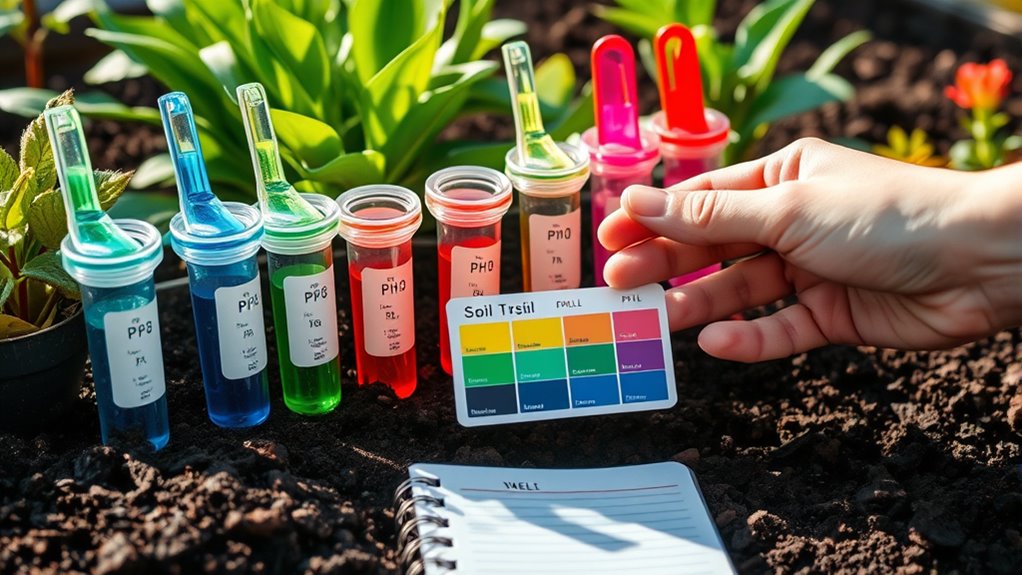
When I'm picking a soil testing kit, I consider a few key factors that can really make a difference. I look at the testing parameters offered, how easy it is to use, and the accuracy of the results. Plus, I always factor in the cost-effectiveness and the number of tests included to guarantee I'm getting the best value.
Testing Parameters Offered
Choosing the right soil testing kit can make a significant difference in your gardening success, especially since these kits often measure essential parameters like pH, Nitrogen (N), Phosphorus (P), and Potassium (K). When I'm selecting a kit, I look for those that offer extensive testing capabilities, sometimes covering up to 140 different tests. This level of detail allows me to monitor my soil conditions thoroughly over time. Additionally, I appreciate kits that provide customized fertilizer recommendations based on my test results, which helps me optimize nutrient application and avoid over-fertilization. However, I keep in mind that accuracy can vary between kits, so I always check user reviews for feedback on reliability compared to lab tests.
Ease of Use
While selecting a soil testing kit, I always prioritize ease of use because a straightforward testing process can greatly enhance my gardening experience. Many kits come with clear, step-by-step instructions, making them accessible for both beginners and seasoned gardeners like me. I appreciate user-friendly components, such as test strips and color charts, which facilitate quick interpretation of results. Some kits even allow for multiple tests at once, so I can assess various soil parameters simultaneously without needing extensive technical knowledge. Portability is another key feature; I love being able to conduct tests in different locations without a lab. Plus, visual aids like colorimetric readings minimize user error, ensuring I get accurate results every time.
Accuracy and Reliability
Accuracy and reliability are essential factors I consider when selecting a soil testing kit. I've noticed that the accuracy can vary, particularly with nitrogen and potassium levels, so it's vital to follow the instructions closely. Many at-home kits provide colorimetric results, which can be subjective; I always compare them against a clear color chart in good lighting. For those seeking more precise readings, professional lab analysis through mail-in kits is often worth it, providing results within a week. I've also found that some kits struggle with consistency across multiple tests. To guarantee I'm making informed soil amendments, I recommend calibrating against known standards or professional tests to verify the accuracy of my at-home results.
Number of Tests
When evaluating soil testing kits, the number of tests included plays a significant role in determining their overall value. I've found kits that offer anywhere from 20 to 140 tests for various soil parameters. If you choose a kit with around 140 tests, you can monitor your soil health thoroughly over time without needing to repurchase frequently. Many kits typically provide about 10 tests each for essential nutrients like pH, nitrogen, phosphorus, and potassium. Knowing how many tests are available helps me decide if a kit fits my gardening needs, especially if I plan to test multiple areas or plant types regularly. A greater number of tests also aids in tracking soil conditions and making informed decisions about amendments.
Cost-Effectiveness
Choosing a soil testing kit that's cost-effective has been a game changer for my gardening experience. These kits save me money by providing at-home analysis, so I don't have to rely on pricey lab services. Many affordable options allow me to test for various soil parameters, often offering 40 or more tests in one kit. I love how quickly they deliver results—within minutes to an hour—helping me make immediate decisions about soil amendments. Regular testing prevents over-fertilization, which means long-term savings on fertilizers and amendments. Investing in a good soil testing kit not only enhances my garden's health and yield but also makes financial sense, whether I'm a novice or a seasoned gardener.
Sample Collection Method
While exploring soil testing kits, I quickly realized that the sample collection method plays an important role in the reliability of the results. Some kits require you to manually collect samples using probes or scoopers, while others offer mail-in services for lab analysis. On-site testing kits provide quick results by mixing soil with water and reagents, but they demand careful sampling techniques to avoid misleading outcomes. Inconsistent sampling depth can lead to inaccurate nutrient levels. Additionally, using tools included in some kits can help guarantee your sample is representative of the area tested. Understanding the recommended collection method is vital, as soil type, moisture content, and depth greatly influence your test results.
Additional Recommendations Provided
Understanding the sample collection method is just the beginning of selecting the right soil testing kit for your gardening needs. I recommend considering the number of tests included in the kit; options usually range from 20 to 140 tests, which can help you monitor your soil's health over time. Evaluate the kit's testing capabilities—pH, nitrogen, phosphorus, and potassium are essential for most gardens. User-friendly instructions are a must, especially if you're a beginner. Speed matters too; some kits offer immediate results, while others require mailing samples, delaying feedback. Finally, verify the kit's accuracy and reliability, as discrepancies can lead to misunderstandings about your soil's condition. Taking these factors into account will set you up for gardening success!
Frequently Asked Questions
How Often Should I Test My Garden Soil?
I usually test my garden soil at least once a year, ideally in the spring before planting. This helps me understand the nutrient levels and pH balance, ensuring my plants get what they need. If I notice any issues, like poor growth or discoloration, I'll test more frequently. By keeping an eye on my soil health, I can make adjustments and boost my garden's productivity. It's all about giving my plants the best chance to thrive!
What Are the Signs My Soil Needs Testing?
I've learned that there are several signs my soil needs testing. If my plants are struggling to grow or showing yellowing leaves, that's a red flag. I also pay attention if I notice poor drainage or a strange smell coming from the soil. Additionally, if I've added a lot of amendments recently or if I'm starting a new garden, it's smart to test. Catching issues early helps keep my garden thriving!
Can Soil Testing Kits Measure Organic Matter Content?
I know some folks think soil testing kits can't measure organic matter, but many actually do! When I test my soil, I look for kits that specifically mention organic matter analysis. These kits often use methods like loss on ignition or other techniques to give accurate readings. Understanding the organic content helps me improve my garden's health and fertility, ensuring my plants thrive. It's a crucial step I don't skip!
Are Soil Test Kits Reusable for Multiple Seasons?
Soil test kits can be a valuable tool, but their reusability depends on the type and components. I've found that some kits offer reusable parts, like the probe, while others come with single-use reagents. If you're looking to get the most out of your investment, check the kit's specifics. I usually prefer kits that allow me to test multiple seasons; it saves money and helps me keep my garden thriving!
How Do I Interpret Soil Test Results Effectively?
Interpreting soil test results can feel overwhelming at first, but I've found it manageable with a few steps. First, I compare the nutrient levels to the ideal ranges for my plants. If nutrients are low, I know to amend the soil accordingly. Then, I check the pH level; it tells me how acidic or alkaline the soil is. Finally, I adjust my fertilization and planting strategy based on these insights for better growth.
Conclusion
In the grand tapestry of gardening, knowing your soil is like holding the key to Narnia—unlocking a world of vibrant blooms and bountiful harvests. With the right soil testing kit in your hands, you're equipped to nurture your garden into a thriving paradise. So, embrace the journey of discovery, and let your plants flourish with the wisdom these kits provide. After all, every great garden starts with a solid foundation! Happy gardening!
